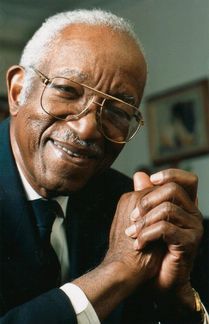Remembering historian, Civil Rights activist John Hope Franklin
 John Hope Franklin, one of the nation's most prominent historians of life in the South and the African-American experience, died Wednesday in Durham, N.C. of heart failure.
John Hope Franklin, one of the nation's most prominent historians of life in the South and the African-American experience, died Wednesday in Durham, N.C. of heart failure. Franklin's voluminous writings cemented his reputation among academics, politicians and civil rights figures as an important historian and chronicler of American history. He was born and raised in an all-black community in Oklahoma and would witness numerous instances of racism in his lifetime. But Franklin would go on to break numerous color barriers during his career. He was the first black department chair at a mostly white institution and the first black president of the American Historical Association. Franklin was also part of the team of scholars who assisted Thurgood Marshall to win Brown v. Board of Education, the 1954 case that outlawed the "separate but equal" doctrine in the nation's public schools.
Below is a videotaped address given by Franklin at the North Carolina NAACP meeting in Wilmington, N.C. in 2007. In it he discusses the issue of reparations for slavery, segregation and injustices such as the 1898 Wilmington race riots.
Franklin saw reparations not as a radical idea, but as part of the larger work for racial justice. In 2007, Franklin returned to Oklahoma to testify in a hearing urging Congress to pass legislation that would clear the way for survivors of the Tulsa Race Riots of 1921, one of the nation's worst race riots, to sue for reparations.
<
This next clip, from the National Visionary Leadership Project, features Franklin speaking about the importance of history. To see more oral history interview clips with John Hope Franklin, visit here.
(First video credit: Interview and editing done by Jim Buie and videography done by Jan Nichols of the NC Justice Center. Thanks to the North Carolina NAACP, www.naacpnc.org.)
